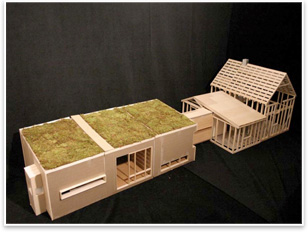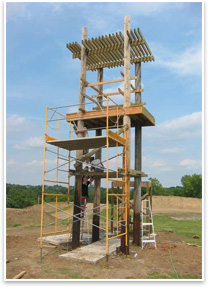
|
AIA Education Honor Award Projects Highlight Housing Prototypes, Building Technology, Visioning Transit
Summary: The AIA on March 9 announced the three recipients of the 2007 AIA Education Honor Awards for excellence in course development and architectural teaching. The Education Honor Awards program, now in its 18th year, recognizes collegiate faculty achievements and contributions to education and the discipline of architecture. This year’s winning projects hale from the University of Virginia, Iowa State University, and the University of Arkansas/the Washington University in St. Louis. The jury looked for evidence of exceptional and innovative courses that deal with broad issues, particularly in cross-disciplinary collaboration and/or within the broader community, contributed to the advancement of architecture education, had the potential to benefit and/or change practice, and promoted models of excellence that could be appropriated by other educators. “All of the award winners took on something new, were innovative models of architecture education, and used technology to facilitate their process,” said jury members. The 2007 AIA Education Honor Awards Winners
ecoMOD is a research and design/build/evaluate project that aims to create a series of ecological, prefabricated, and affordable housing prototypes. The goal of this architecture and engineering school partnership is to demonstrate the environmental and economic potential of prefabrication and challenge the modular housing industry to explore this potential. “The project took on several topics: ecology, modular construction, and affordable housing,” the jury said. ”It put them together in a variety of prototypes that can be customized by the user.”
SCI-TECH is an intensive, four-course sequence designed to familiarize graduate students in a first professional degree program rapidly with building technology’s fundamental principles and applications. The sequence encourages connections among technology, studio, and history/theory by adopting practice as its basis. “SCI-TECH pulls together challenging subjects in a core curriculum for students in a first professional degree program,” the jury commented. ”This sequence of courses is an excellent example for architecture programs that want to integrate building technology into the curriculum.”
The challenge of the studio is to assist Northwest Arkansas in understanding the community design possibilities in the development of a regional rail transit system. Student-developed proposals focused on optimal development of underutilized local land, including historic downtowns, and provided smart-growth alternatives to prevailing suburban development patterns. “This is an effective use of scenario planning with legible, impactful graphics that can be shown to the community,” said the jury. ”There is an appealing levity in the work.” |
||
Copyright 2007 The American Institute of Architects. All rights reserved. Home Page |
||
news headlines
practice
business
design
The AIA Education Honor Awards were announced March 8 during the ACSA Awards Ceremony at its annual meeting in Philadelphia. The awards will be presented to the 2007 recipients in May during the AIA National Convention in San Antonio.
Captions
The University of Virginia’s SEAM (sustainable, economical, additive modules) prototype housing project.
Iowa State’s SCI-TECH four-course sequence rapidly familiarizes graduate students in a first professional degree program with building technology’s fundamental principles and applications.
The challenge of the University of Arkansas/Washington University in St Louis studio is to help the people of Northwest Arkansas understand the community design possibilities in the development of a regional rail transit system.

 Project:
Project: Project:
Project: Project:
Project: